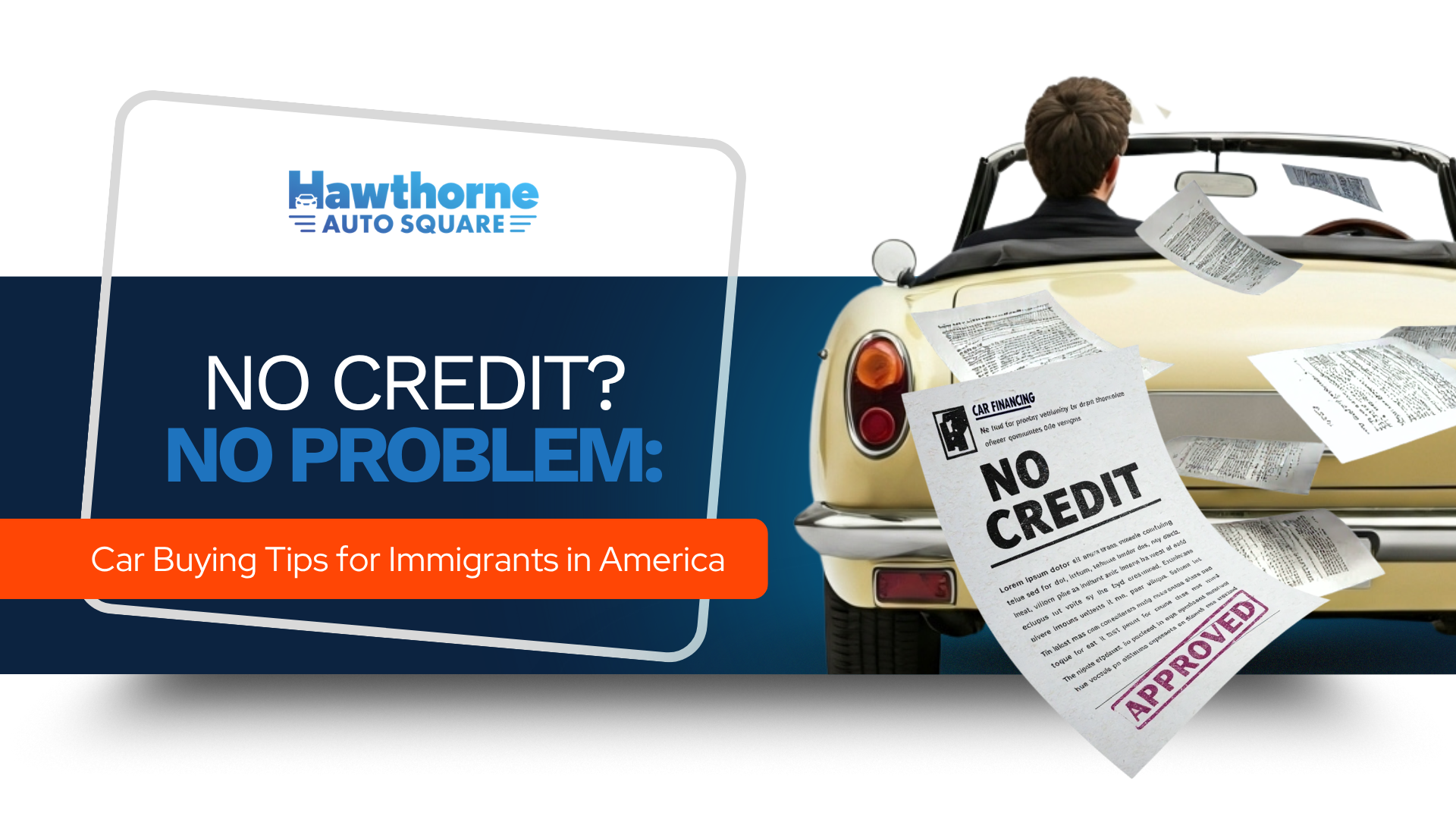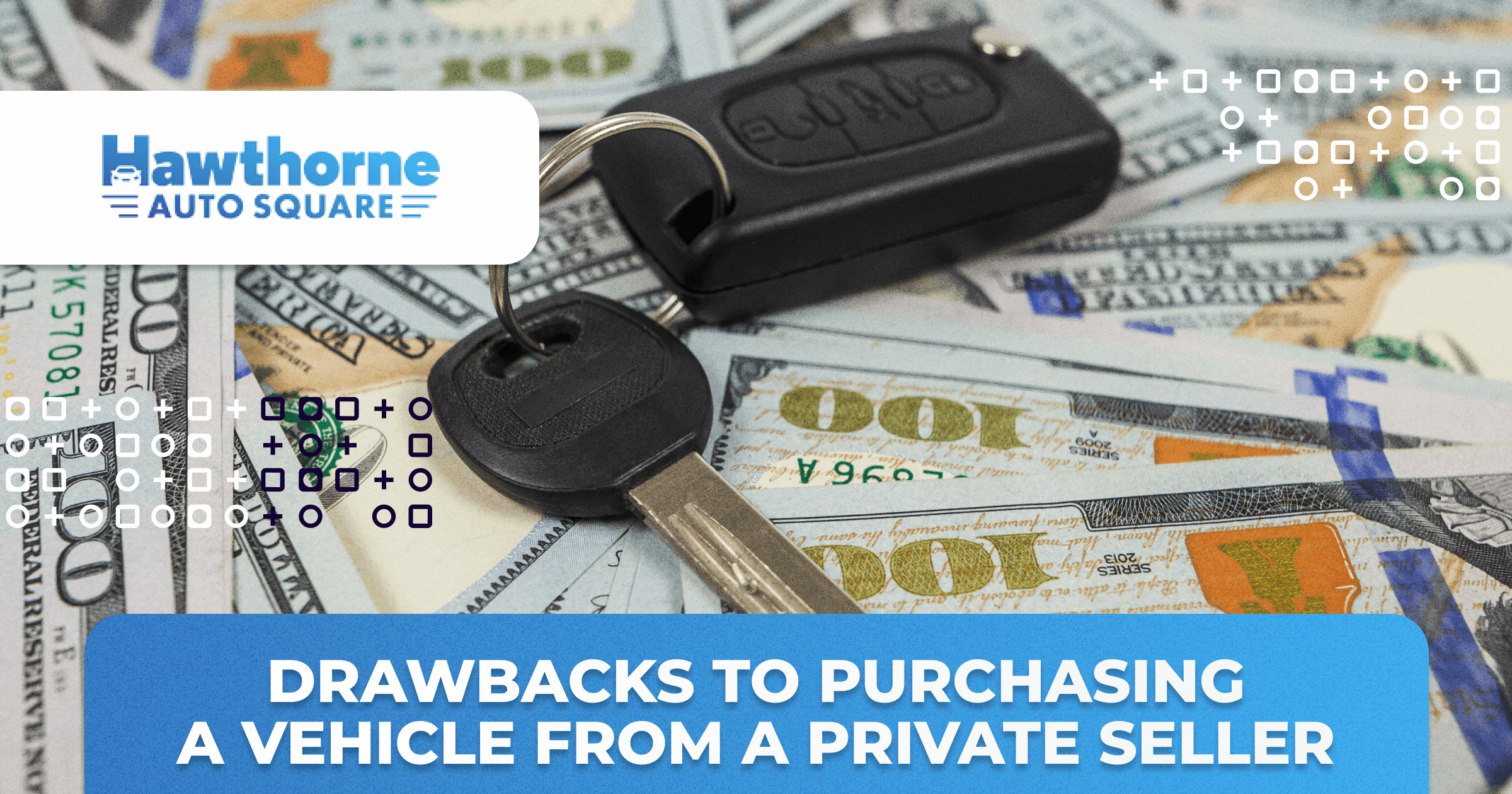
- SALES : (866) 707-7664
- PAYMENTS : (866) 902-7955
- 11646 PRAIRIE AVE, HAWTHORNE, CA 90250
- MON - SAT 8AM - 8PM | SUN 10AM - 6PM
- SALES : (866) 707-7664
- PAYMENTS : (866) 902-7955
- 11646 PRAIRIE AVE, HAWTHORNE, CA 90250
- MON - SAT 8AM - 8PM | SUN 10AM - 6PM
Drawbacks to Purchasing a Used Car from Private Sellers

Whether you’re commuting through Los Angeles or cruising the Pacific Coast Highway, the right vehicle is essential. Purchasing a used car from a private seller instead of a dealership may offer advantages, but it poses some significant risks.
Sure, you might get a good price upfront, but opting for a private seller vs. a dealership may result in driving a lemon. Read about the potential risks of private sellers and make an informed choice.
Lack of Warranty and Guarantees
A private seller won’t provide a warranty, which means your vehicle is only guaranteed if it’s still under the manufacturer’s warranty. It’s your responsibility to ensure the vehicle is in good condition with a professional pre-sale inspection and fix any problems that arise. Private sellers won’t cover the cost since they’re not guaranteed a sale.
Dealerships often provide warranties and certified pre-owned programs on used vehicles that entail thorough inspections, maintenance, and repairs. Purchasing from a dealership also allows you to pursue recourse (as per lemon laws) from the dealership should your vehicle.
Limited Transparency in Vehicle History
Dealerships typically provide vehicle service histories for used cars, which can include past accidents, maintenance, and repairs. These details are necessary for assessing the condition of the car, determining its potential lifespan, and identifying any unresolved issues.
Private sellers may not be able to provide full transparency about the vehicle’s condition because they lack the records or are unwilling to share them. This offers the potential for undisclosed and deal-breaking issues. This is especially true if the seller performs many of their own repairs and maintenance. While many people are adept with automotive repairs, you’re trusting that a seller actually performed the services as they claim, and to an acceptable and safe standard.
Challenges in Negotiating Price
Private sellers may have an emotional attachment to their vehicle and base their pricing on how much they paid for it, which can be much higher than the fair market value. In comparison, dealerships have a thorough understanding of the used vehicle market and price used vehicles accordingly.
Lack of Financing Options
Buying a used car from a private seller presents limited financing options. They usually want payment upfront and unless you have an excess of cash, your financing options are limited. Personal or vehicle sale loans can be hard to secure if your finances aren’t in ideal shape.
Dealerships typically offer pre-approval and financing options from several lenders, enabling more competitive interest rates and payment plans. While great personal credit is best for getting competitive financing, dealerships can often secure financing for customers who may not qualify for a personal loan from their bank.
Paperwork Complexity
Private vehicle sales require certain paperwork, depending on the circumstances, which can be time-consuming and frustrating. You’ll require ownership transfer paperwork to obtain the vehicle title and a bill of sale for tax purposes. This paperwork can present issues if there are liens, physical damages, or other problems with the title. When you purchase a vehicle from a dealership, they’ll handle all the paperwork and streamline the process for you.
Seller’s Trustworthiness
Meeting with a stranger for a private vehicle purchase can feel unsafe. You don’t always know if they are scammers trying to sell a stolen vehicle. Protect yourself by performing a stolen vehicle check beforehand and meeting in a public location in daylight, ideally with a friend.
Dealerships verify vehicle titles for their inventory to protect their liability. While private sellers can simply disappear after a sale, dealerships are incentivized to provide a safe sale experience to buyers to maintain their public reputation and legal standing.
Consumer Protection Laws Don’t Apply
Dealerships must comply with a variety of state and federal laws and regulations to prevent dealer fraud such as price inflation, misrepresentation, or withholding information. The Federal Trade Commission enforces a Used Car Rule that requires dealers to post a Buyers Guide. This rule doesn’t usually cover buying cars from owners, and they’re unlikely to account for any problems that occur with the vehicle later.
Responsibility for Emissions and Safety Compliance
Emissions testing and smog inspections involve an inspection of emission control systems. They are mandatory for most vehicle sales in California. Mechanical safety inspections are also required to verify the integrity and safety of vehicles on the road. Skipping these requirements can result in consequences such as fines, prohibition from operating the vehicle, delays in registering the vehicle while awaiting necessary repairs, and liability in case of accidents.
Dealerships and private sellers are responsible for providing proof of emissions and safety certification to the buyer before the sale. Dealership processes are regulated and should always provide the correct documentation, but private sellers may not provide valid documentation or take advantage of an uninformed buyer, leaving them with extra repairs after the purchase.
Fewer Options
Dealerships usually have an expansive inventory with a choice of different models, trims, and other features. It can take time to find a private party selling exactly what you want, but a dealership is more likely to have the inventory you want and can even source something specific for you upon request.
Check Out Hawthorne Auto Square’s Used Vehicle Inventory
A used car should give you freedom to explore California, not break down in the middle of rush hour traffic. Choosing a private seller of a dealer can often lead to bigger headaches and costs. The team at Hawthorne Auto Square offers an extensive inventory of low-mileage and pre-owned vehicles of both economy and premium makes.
You can also get pre-approved for in-house used car financing, take advantage of our standard 6-month comprehensive warranty, and get a trade-in estimate on your current vehicle. To get started, contact us to make an appointment or schedule a visit online.
FAQs
What else should I look for when purchasing a used vehicle?
When purchasing with respect to your budget and individual needs, consider factors such as fuel economy, safety rating, recalls, mileage, and full service history.
How many miles is the average lifespan of a car?
The average vehicle lasts about 200,000 miles. Factors such as quality manufacturing and proper maintenance can help extend the lifespan of a vehicle.
Latest News


Why Should I Buy a Used Toyota Camry?

Bankruptcy and Car Ownership: How BHPH Can Help


Used Car Price Trends for 2025: What Buyers & Sellers Need To Know
Get approved
It only takes a few minutes and won’t affect your credit.
- Pre-Inspected Cars
- Clean Title
- Under Warranty
Latest Videos
What Do I Need To Buy A Car - Hawthorne Auto Square
Second Chance for a New Car - Hawthorne Auto Square
Pre Approved Auto Lone – Hawthorne Auto Square
- SALES : (866) 707-7664
- PAYMENTS : (866) 902-7955
- 11646 PRAIRIE AVE, HAWTHORNE, CA 90250
- MON - SAT 8AM - 8PM | SUN 10AM - 6PM
© 2025 Hawthorne Auto Square. All Rights Reserved. Website Designed by: Ad Leverage | Privacy Policy | Terms of Service | Manage Cookies | DSAR |License #91864
© 2025 Hawthorne Auto Square. All Rights Reserved. Website Designed by:
Ad Leverage | Privacy Policy | Terms of Service
License #91864

